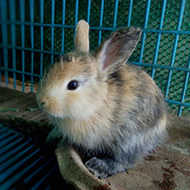
The PSDA PAW Report reveals shocking statistics for pet rabbits.
The PDSA's 2021 PAW Report found that 48 per cent of domestic rabbits in the UK now live alone – an increase from the previous year's 42 per cent.
Of the owners who said that their rabbit lived alone, 34 per cent said that this was because they had previously owned more than one rabbit but the others passed away, and they did not want to replace them.
In the PAW Report, the PDSA said that whilst owning one rabbit is understandable for owners who no longer wish to own rabbits once their current one has passed away, the statistic suggests a worrying trend which needs addressing for the welfare of the solitary rabbits.
Other reasons given for solitary rabbit ownership were not wanting to own more than one rabbit (27 per cent), thinking that their rabbit doesn't like other rabbits (14 per cent), and 13 per cent had never even considered getting another rabbit.
Also given as reasons for owning solitary rabbits were not yet getting round to owning another rabbit (9 per cent), and only being able to afford one rabbit (6 per cent).
The PSDA commented on these statistics in the PAW Report, saying that the reasons given for solitary rabbit ownership reflected a lack of awareness concerning the importance of rabbit companionship, and highlighted the valuable nature of educating rabbit owners before purchase.
The findings in the report also suggested that 16 per cent of pet owners agree that owning a pet makes them stressed, with rabbit owners experiencing the highest percentage of stress due to pet ownership. Twenty-two per cent of rabbit owners said that owning their rabbits made them stressed.
Commenting on the statistics, BVA vice-president Daniella Dos Santos said: “The latest PDSA PAW Report statistics on pet rabbits mirror what our survey of the veterinary profession found back in 2019, when vets reported that nearly half the pet rabbits they see spend their life alone.
“We know that whether they are kept outside or inside the house, pet rabbits are highly sociable animals, so it’s a big concern that so many in the UK still live solitary lives. As part of BVA’s #ItTakesTwo campaign, launched last year, we continue to call for vets, pet sellers, breeders, animal welfare organisations and Government to work together to improve awareness of the need for housing pet rabbits in compatible pairs or groups.
“We advise anyone thinking of taking on a pair or group of rabbits to seek expert veterinary guidance to help make sure that the match is successful.”



 The RCVS has announced a new version of its 1CPD mobile app, with enhanced features for veterinary surgeons and veterinary nurses to record their continuing professional development.
The RCVS has announced a new version of its 1CPD mobile app, with enhanced features for veterinary surgeons and veterinary nurses to record their continuing professional development.